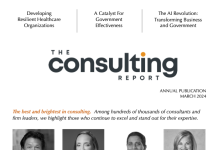Boston Consulting Group senior partner Mai-Britt Poulsen believes trust has never been more important in business relationships, especially now that businesses are under greater scrutiny than ever before to “do the right thing” with compassion and competence.
According to Poulsen, trust “will be a key factor in determining whether businesses will sink or swim in the months and years to come. Yet most business leaders are just beginning to understand its true importance.”
Poulsen believes trust has genuine economic value. It allows new, disruptive products to be developed, and it makes transactions easier among buyers and sellers who have no prior relationship with each other. But trust is also essential for a company’s ability to attract talent and for its ESG performance.
Prior to this year’s World Economic Forum in Davos, Switzerland, BCG launched its Trust Index, using AI to analyze and quantify the perceptions of stakeholders. It measured more than 1,000 of the world’s largest companies and found that trust actually does equate to economic value. In fact, the 100 most trusted companies generated 2.5 times as much economic value as comparable businesses by the end of 2021. But trust does not remain steady. For any given year, fewer than half of the top 100 companies were still in the top 100 the following year.
But losing trust is avoidable, and business leaders can build and maintain trust in several ways. They can think of their business as a system that takes into account all external stakeholders, identify the promises the business is making to different stakeholders and ensure that it is living up to them, and create a vision of how they want the business to be perceived and formulate a plan to get there.
Companies must lay a foundation of trust by, among other things, maintaining solid financials, a satisfied workforce, and high product and service performance. A company cannot be highly trusted without this strong foundation.
Companies can also enhance and deepen trust through strategic collaboration and investment, innovation, digital capabilities, social responsibility, and environment and sustainability initiatives.
Conversely, companies can erode or break trust through corruption, fraud, scandals, natural disasters, and human-caused debacles.
Trust is dynamic and ever changing, and leaders have to anticipate internal and external forces that may affect trust and measure, learn, and adapt their strategies in response.
“As business leaders, we need to see trust as an asset that needs to be nurtured, protected, as well as measured and valued,” says Poulsen. “The role of the CEO is evolving at pace thanks to—amongst other factors—the growing importance of trust. In response, CEOs should ensure that their company is forging and managing trust in business and socioeconomic systems. Companies that do so will enjoy long-lasting advantage.”

























